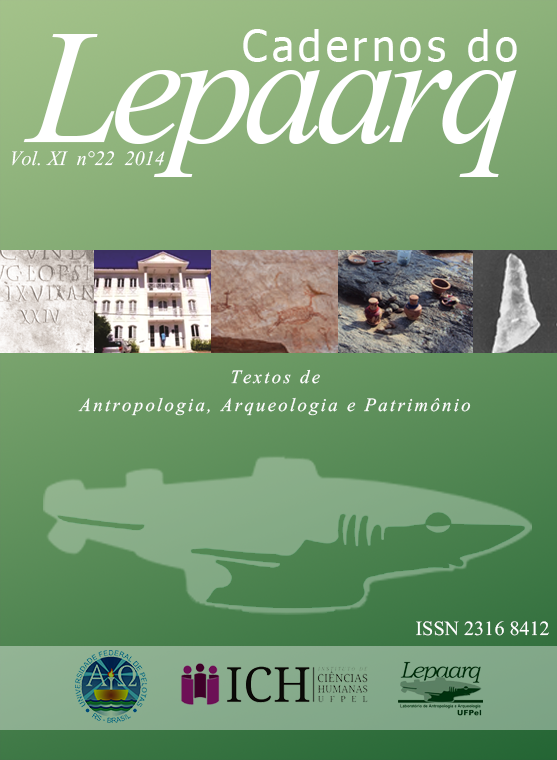Diferentes teorias e práticas pedagógicas de arte na construção da cidadania
Resumo
Resumo: O presente trabalho trata de uma experiência realizada através de oficinas didático-pedagógicas em duas Instituições Públicas, sendo uma de ensino e outra assistencial, especificamente uma escola municipal de ensino fundamental e uma Casa Lar para Menores. A investigação realizada foi do tipo pesquisa-ação. Os autores levando em consideração o pensamento de teóricos da área de educação verificaram e analisaram os diferentes comportamentos observados no processo de ensino-aprendizagem nas duas instituições a partir do público-alvo envolvido. Os graduandos tiveram por referência alguns teóricos abordados, especialmente, nas disciplinas de Pedagogia e Arte-educação, do Curso de Artes Visuais Licenciatura.
Abstract: This paper deals with an experiment carried out through didactic and educational workshops in two public institutions, one of education and other assistencialist, specifically a municipal elementary school and a House for Children. The investigation-type was the action-research type. The authors considering the thought of the theoretical area of education verified and analyzed the different behaviors observed in the teaching-learning process in two institutions from the audience involved. The theoretical reference for graduate had addressed, especially in the disciplines of Education and Arts Education, the School of Visual Arts Degree.
Downloads
Referências
A COR DA CULTURA. Disponível em <http://www.acordacultura.org.br>. Acesso em 20/10/2013.
A COR DA CULTURA. Modos de Ver. Rio de Janeiro: Fundação Roberto Marinho: Saberes e Fazeres, v. 1, p. 88-103, 2006.
A COR DA CULTURA. Modos de Sentir. Rio de Janeiro: Fundação Roberto Marinho: Saberes e Fazeres, v. 2, 2006.
A COR DA CULTURA. Modo de Interagir. Rio de Janeiro: Fundação Roberto Marinho: Saberes e Fazeres, v. 3, 2006.
ILHA DAS FLORES, A. Direção: Jorge Furtado. Brasil: Casa de Cinema de Porto Alegre, 13min., 1989.
ALVES, R. Conversas Com Quem Gosta De Ensinar. São Paulo: Cortez, 1984.
DUARTE JÚNIOR, J. F. Por que Arte-Educação? Campinas: Papirus, 1983.
ESCOLA INTERATIVA. Arte em Estudo. Disponível em <http://goo.gl/6FKujA>. Acesso em 10/10/2013.
FREIRE, M. Sinais do Corpo. Diálogos Corporificados, n. 7, ano 3, jul. 2000. Disponível em <http://www.pedagogico.com.br/info7a3.html>. Acesso em 10/10/2013.
FREIRE, P. Pedagogia da Autonomia: saberes necessários à prática educativa. Rio de Janeiro: Paz e Terra, 1997b.
QUIXOTE RECICLADO. Roteiro: Philippe Henry. Disponível em <http://youtu.be/DCvOockZlrI>. Acesso em
/10/2013.
WALL-E. Direção: Andrew Stanton. Produção: Jim Morris. EUA: Disney, 98 min., 2008.
Os Cadernos do LEPAARQ publicam artigos em português, espanhol, italiano, francês e inglês, sem cobrança de nenhum tipo de taxa em nenhum momento, respeitando a naturalidade e o estilo dos autores. As provas finais serão enviadas aos autores, para sua conferência antes da publicação. O Conselho Editorial não se responsabiliza por opiniões emitidas pelos autores dos trabalhos publicados. O periódico Cadernos do LEPAARQ oferece acesso livre imediato ao seu conteúdo, seguindo o princípio de que disponibilizar gratuitamente o conhecimento científico ao público proporciona maior democratização mundial do conhecimento. Os textos publicados poderão ser depositados imediatamente pelos autores em suas páginas pessoais, redes sociais e repositórios de textos.Nesse sentido, o periódico não tem fins lucrativos, de modo que os direitos autorais dos artigos publicados pertencerão aos respectivos autores e estes não receberão nenhuma forma de remuneração. Dessa forma, ao enviar o artigo, o autor do mesmo estará automaticamente aceitando esta condição. A reimpressão, total ou parcial, dos trabalhos publicados deve ser apenas informada pelos seus respectivos autores ao conselho editorial do periódico. OBS. Cabe(m) ao(s) autor(es) as devidas autorizações de uso de imagens com direito autoral protegido (Lei nº 9610, de 19 de fevereiro de 1998), que se realizará com o aceite no ato do preenchimento da ficha de inscrição via web.





